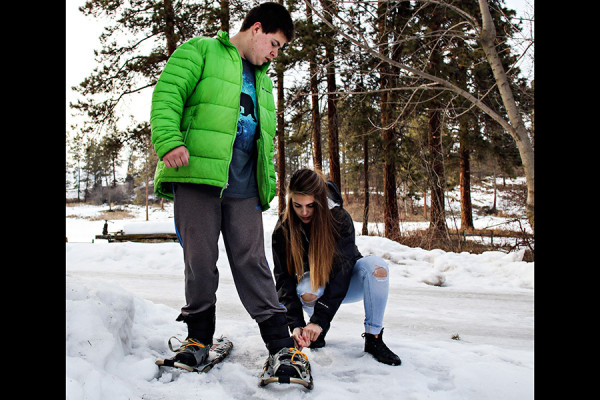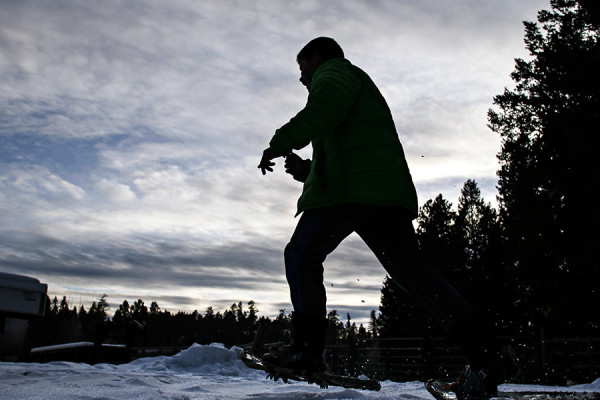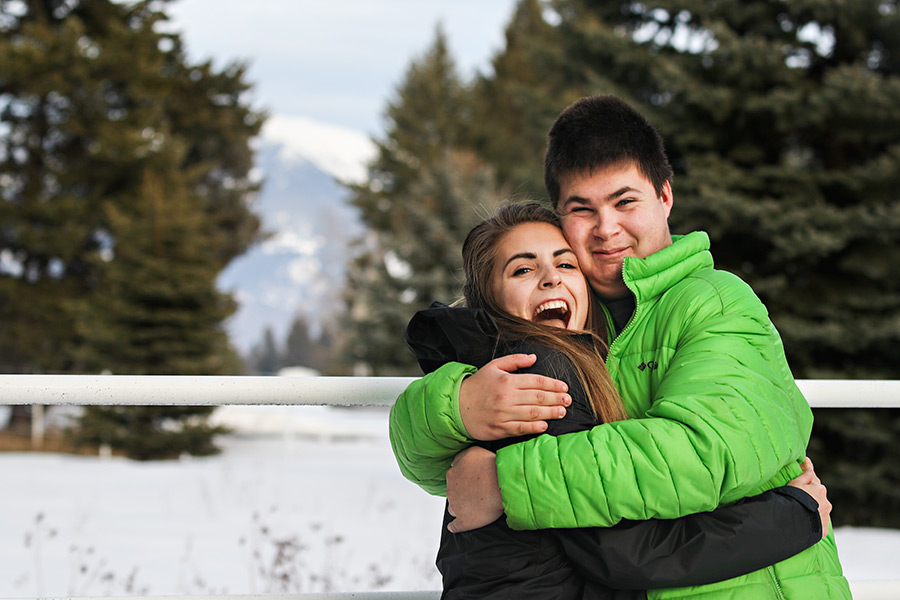Standing in front of a bend of the Whitefish River at sunset last week, siblings Katey and Dusty Deist were doing their best to pose for a photographer before the light faded.
Katey, 18, stood in the ankle-deep snow in Converse sneakers, while her brother, 15-year-old Dusty, tried to arrange himself close enough to her while also managing the unwieldy snowshoes on his feet.
When it seemed like too much, he bent down to remove the cumbersome footwear.
“Don’t take them off,” Katey said, leaning down to help him strap the snowshoes back on.
“But they’re uncomfortable,” Dusty replied.
“You have, like, two more minutes, you’ll be good,” Katey said.
“OK,” Dusty said, settling for throwing his arm around her shoulder before the camera clicked.
And that could have been that, an older sister getting her younger brother in line. But it’s these in-between times that shine a light on the true nature of Dusty and Katey’s relationship, when they think no one is looking or paying attention, when it’s the two of them joking and exchanging raised-eyebrow looks, just trying to help each other figure it all out.
As a person with intellectual disabilities, Dusty navigates the world with a few more challenges than his sister. But instead of pulling away and going off on her own, Katey has embraced her brother’s challenges, leading her to appreciate the struggles many people with disabilities endure.
Her work with Montana Special Olympics and creating a more supportive environment at Flathead High School earned her the Youth Volunteer of the Year award. And with the Special Olympics of Montana State Winter Games ready to take place at Whitefish Mountain Resort from Feb. 28 to March 1, Dusty is preparing to take home more hardware in the snowshoe races.
“I’m very proud of both of them,” Kim Deist, the siblings’ mother, said. “She’s been very protective and a great advocate for him and other kids. He’s protective of her, too.”

In 1970, Special Olympics Montana held its first Summer State Games, with about 400 athletes in attendance. These days, more than 2,000 athletes from 65 Montana communities train year-round for the summer and winter games.
Terri Siefke, the director for the Glacier Area for Special Olympics Montana, said the Flathead community has evolved as a more open place for people with disabilities in recent years, thanks in large part to better visibility and education.
Her daughter Chrissy is an athlete for Special Olympics, and life proved it could be difficult when it came to interacting with the local community.
“Not that many years ago, people with disabilities were closeted, they were put away and nobody wanted to talk about them or see them,” Siefke said. “Whenever we go someplace, to a store, mall or whatever, there’d be people that just kind of stared at her, like ‘You’re different,’ but now anymore, a lot of the time when we go to a place, people are coming up and saying, ‘Hi, how are you?’ It’s changing.”
That change is due in large part to the younger generations receiving more education and having better policies in place, Siefke said, and because of people like Katey and Dusty, who are willing to stand up for their fellow classmates and athletes.
A couple years ago, when Katey was a sophomore, her mom was trying to get both her and Dusty out the door to the dance held at each Special Olympics games. Katey had a huge chemistry test the next day, and Dusty was feeling tired, so wrangling the surly teens into the car and to the dance proved a testament to their mother, Katey said with a laugh.
Neither knew there was a seriously fun party waiting for them.
“By the time we got there, within 15 minutes, we didn’t want to leave,” she said.
After dancing the night away with Dusty and his fellow athletes, Katey knew she wanted to continue standing with her brother. He was two years from high school, a place where athletic prowess is at a premium and bullying can be brutal.
She realized her brother and athletes like him should be as celebrated as anyone else, and that her school needed to change.
With the help of a teacher and her friend Amalia Csaplar, Katey founded the Flathead Youth Activation Committee to raise awareness and funds for Special Olympic athletes.
The group was approved last January, and since then, it has raised money through the Penguin Plunge program, by selling candy bars, handing out wristbands, and facilitating events such as Spread the Word to End the Word, which was a push for students to take the word “retarded” out of their vocabularies.
About 200 kids agreed to stop using the word, Katey said, and many told her it was about time someone did something about it.
Last year’s spring assembly was also the first time at Flathead High that the Special Olympic athletes were recognized along with the school’s athletic program participants, which Katey said was “really cool,” and a Special Olympics athlete is on the FHS winter athletics poster this year.
“That’s where Katey and Dusty help,” Siefke said. “They’re out there with the kids, and they can see that he’s not that much different than we are.”
Being chosen as Youth Volunteer of the Year is an honor, Katey said, but her real rewards come when her awareness activism is met with open minds from her peers.
“A title’s cool and everything,” she said. “I’d just like everyone to support [Special Olympic athletes] at school, but they don’t know they’re there. They do so many incredible things – it needs to be shown to everyone.”

Dusty is in his first year at Glacier High School, which he chose because of the special education opportunities there. While he’s quite adept at snowshoeing – during competition, the athletes sprint for 50 meters with the clunky footwear – his heart is with basketball.
He started with Special Olympics when he was in seventh grade, and the fistful of gold and silver medals he has is a testament to the work he’s put in. As a part of the Kalispell Public Schools Team, he plays games at the local and state level, even traveling on his own with the team.
As a basketball player, Dusty said he prefers the sport to snowshoeing because “snowshoes are hard to get on,” and because he enjoys the team aspect of running up and down the court during a ball game.
Special Olympics offered a chance for Dusty to blossom, Kim Deist said, and it gave the family a look at different aspects of Dusty’s personality, especially when it comes to performing in sports that aren’t necessarily his favorites.
“We learned he’s very competitive,” Kim said. “It takes a lot of courage to go outside your comfort zone and really push yourself.”
There’s nothing graceful about sprinting in snowshoes, but Dusty is fast and agile, though the most powerful aspect of his performance is the huge, open-mouthed smile that erupts on his face any time he runs.
He and Katey like to joke around, but he’s the practical joker of the two. Once, he filled one of her friend’s shoes with water then put them in the freezer. The first words they both used to describe each other were “humorous” and “funny.”
Dusty is more apt to talk about his sister than himself, and when asked what her plans are after graduating high school this spring, he answered for her: “Going to college.”
Katey plans to study counseling at Montana State University in Bozeman, so she can continue to help others.
Watching the two walk up the driveway from their house, Kim said her daughter’s support and friendship has been integral for Dusty, and she’s not sure how he’ll handle Katey’s departure for college.
“I think he’ll be lost for a little while,” Kim said.
The separation may be difficult, but there’s also hope that the work the siblings have done to raise awareness and respect for their peers will continue to evolve, and that Dusty will finish out his high school career as a celebrated athlete, just like anyone else.
“With that comes acceptance,” Siefke said. “That’s basically what [Katey and Dusty] represent to me, is being accepted in the community and growing that acceptance and growing the awareness that we’re not different.”
